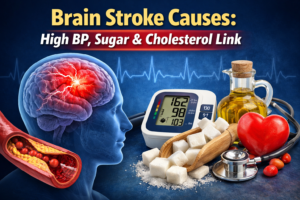“Here is my MRI and it shows a brain tumour, for Christ’s sake. Why me?” implored Elton John, a visibly upset 60-year-o ld theatre artist. His real name was Eric Jamaspa, but he preferred to use his stage name. He was dressed in an effervescent floral shirt, above-ankle striped pants, and below-ankle polka-dotted socks with white canvas shoes without laces. He donned black-rimmed, round Corbusier glasses and carried his reports in an oversized recycled Freitag bag – a company renowned for making items out of truck tarp, cycle tubes, and car seatbelts.
ld theatre artist. His real name was Eric Jamaspa, but he preferred to use his stage name. He was dressed in an effervescent floral shirt, above-ankle striped pants, and below-ankle polka-dotted socks with white canvas shoes without laces. He donned black-rimmed, round Corbusier glasses and carried his reports in an oversized recycled Freitag bag – a company renowned for making items out of truck tarp, cycle tubes, and car seatbelts.
How can someone who dresses like that ever be upset about anything, I thought?
I believe doctors are allowed to make harmless assumptions in a lighter vein about the people they meet. We encounter personalities from varied backgrounds on a daily basis – those who dress peculiarly, smell weirdly, behave oddly, and have mixed (often indiscriminate) opinions about their doctors – so why can’t we make quick seemingly rational conclusions about our patients in jest?
As neurosurgeons, we sporadically see patients who are of the firm belief that there is something wrong inside their head despite completely normal scans and reports. Excess ‘gas’, panic attacks, ulcers, insomnia, and even erectile dysfunction are often attributed to something structural changing or going on ‘up there’. Quick analytical conclusions about various personalities are required to ascertain if the problem is organic or functional, followed by a referral to the concerned specialists, often psychiatrists.
“Why did you get an MRI to begin with,” I questioned, quickly attempting to resolve his problem and alleviate his anxiety. He widened his eyes, removed his spectacles in a lightening move and placed them on my table. On closer inspection I noticed the glass had a pink tint on it. He pouted his lips and expressed that all he had was an infrequent headache. “And?” I probed, wanting him to speak openly. “And I used to forget some lines during rehearsals, but which guy my age doesn’t?” he questioned, with his hands flung open wide, almost toppling my computer.
I wanted to remind him that he was not on stage right now and should calm down, but I didn’t have the heart. I have been an amateur theatre performer once myself, and I could relate to wanting to have your moment. All the time.
I explained to him that all brain tumours do not necessary present themselves with raised intracranial pressure. He instantly and animatedly chinked his eyes and raised one eyebrow, which, I assumed, was a gesture asking me to explain further. “You don’t have to have headaches with vomiting, double vision, or a seizure or weakness in the limbs to have a brain tumour. These symptoms depend on the location and size of the tumour. Often, if a headache wakes you up in the middle of the night, that’s not a good sign. I usually recommend a scan for even a mild to moderate headache if it doesn’t go away in a few weeks. However, MRIs tend to pick up several lesions on the brain, but not all of them require treatment. A lot of these are ‘incidental’ findings and can be left alone or closely monitored. But what you have is probably a low-grade cancer in a relatively safe area.”
“Cancer!” he yelled. Two nurses left their workstations and ran into my room to check if everything was ok. I reassured them that all was in control. I had resigned myself to the fact that the conversation was going to proceed with a flair of the dramatic. I told him that he should be relieved that the doctor who had ordered the MRI had picked this up in its nascent stage, and that removing the tumour would result in a positive outcome. If we were to let it be, it would most likely advance to a higher grade, defeating the purpose of an early diagnosis.
“What have I done to deserve this?” he lamented, another question that we as surgeons are not unfamiliar with. Before I could say “nothing,” he leaned closer and whispered, “Has me being gay got anything to do with this? I’ve been completely faithful though,” he added just as vociferously, wondering if I was going to give him some karma BS. “Absolutely not,” I asserted, reposing his faith that it was perfectly acceptable to make one’s own lifestyle choices. Being gay was partly genes, partly environment, partly chance and for some partly luck, I reasoned. He pecked me on the cheek and repositioned himself in his chair, a little mollified. Me, on the other hand was still recovering. Did anyone mention social distancing to Elton?
All the world’s a stage, said the Bard, and all the men and women merely players. He was playing his part and I was trying hard to play mine. Conversations with patients are never easy: Some are filled with hope, others with despair. Most are emotional; anger is a rarity. Very few are as theatrical as John was. There is almost always an element of gratitude, but, not infrequently, there is also criticism. They look to you for reassurance even in the terminal stages of an illness and yet expect integrity. I’m usually extremely optimistic, but I can recall quite a few instances where patients have cheered me up with the magnanimity of their hearts when there was nothing more I had to offer. Sometimes doctors need to be ‘healed’ too.
A lot of people ask, “Why me?” when confronted with the diagnosis of a brain tumour. Besides the scientific answers (to simplify it, tumours are caused by mutations in genes), I’ve tried many others – from “why not you?” to “I don’t know” and “if I knew, I’d get the Nobel Prize.” None of these provide any solace or comfort, of course, but when I leave them with, “Tomorrow, it could even be me,” there is the silent acceptance of the universality of nature’s fallibility.



